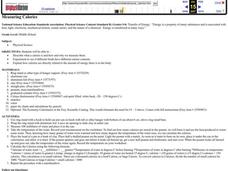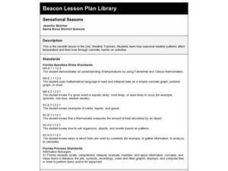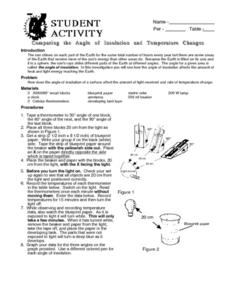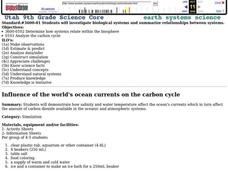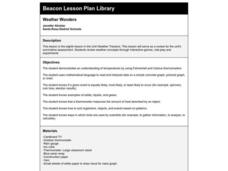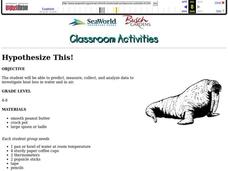Curated OER
Measuring Calories
Learners investigate what a calorie is and how and why we measure them. They conduct an experiment to compare the calories of a peanut and a mini-marshmallow, and explain and discuss how calories are directly related to the amount of...
Curated OER
Dead Body Math
Students solve the mystery of dead Mr. Potato Head using physics and algebra. They discuss Newton's Law of cooling as it applies to the mystery scenario involving a cooling baked potato as the "victim". They manipulate algebraic...
Curated OER
Heat Transfer & Phase Changes
In this heat transfer and phase change worksheet, students experiment with ice, salt, and milk to show the relationship between the temperature of a solution and its phase. Students turn milk from a liquid to a solid and graph the...
Curated OER
Measuring Calories
Students burn peanuts and marshmallows to determine the calories each contains. In this calorimetry lesson, students set up an apparatus with a ring stand and water in an aluminum can. They record the temperature of the water before and...
Curated OER
Death On Board La Belle: Finding Clues from Old Bones
Students practice analyzing skeletal remains for clues by using the Internet. In this scientific investigation lesson, students research the La Belle shipwreck using the Internet and written materials, later completing a Skeletal Report...
Cavalcade Publishing
Charles' Law Worksheet
Although it was published in the year 2000, this chemistry assignment is ideal for practicing the application of Charles' law. There are seven real-world problems to solve, and plenty of space provided for doing so. Add this to your...
Santa Monica College
Introducing Measurements in the Laboratory
We use basic units of measurement to break down things and communicate clearly. The first lesson in an 11-part series teaches the proper way to measure various items. It starts simply with measuring the dimensions and areas of geometric...
Curated OER
Exploring Regions of Our World
Examine how climate and landforms affect plants and animals that live in particular areas. Discover that these same factors affect peoples' homes, jobs, and recreational activities. Pupils research ecosystems and biomes, and then write...
Curated OER
It's About Time!
Students examine concept of time, and explore difference between analog and digital clocks; students make art project to represent time and create a time-story problem and solution.
Virginia Department of Education
Heat and Thermal Energy Transfer
How does radiation affect our daily lives? Answer that question and others with a lesson that discusses radiation and its use in thermal energy transfer through electromagnetic waves. Pupils investigate vaporization and evaporation while...
Curated OER
Mapping a Temperature Field
Students measure and graph temperatures. In this temperature field lesson students use a map to measure and plot field values and construct isolines and interpret the results.
Curated OER
Sensational Seasons
Second graders explore how seasonal weather patterns affect temperature and their lives.
Curated OER
Angle Insolation
In this science worksheet, high schoolers look for the answers that are related to the concept of insolation and measuring different angles.
Curated OER
Calendar Time
Use circle time to work on counting. Kindergarteners practice the months of the year, say the full date, chart the day's temperature, count to 100, and sing the alphabet song. This kind of daily routine cultivates deep roots for...
Curated OER
Earth Systems
Ninth graders investigate biological systems. They summarize relationships between systems. Students determine how systems relate within the biosphere. They analyze the carbon cycle.
Curated OER
How Hot Is Hot In Namib?
Students research and demonstrate the temperatures of the Namibian Desert. They watch and discuss a video, conduct an experiment to demonstrate the desert temperatures, record their results in the form of a graph, and compare/contrast...
Curated OER
Our Desert Backyard
Students make observations of their own backyard. In this environment lesson, students keep records of the plants and animals they see in their home or school yard. Students make notes of how the weather and environment changes over...
Curated OER
How the Amount of Solar Energy Absorbed by the Earth is Dependent Upon the Earth's Position
Students investigate the angle of light and how it faces the earth. They conduct a series of investigations with the following two objectives. Students determine if the angle of light is a factor in the absorption of heat. They correlate...
Curated OER
What is a Cloud
Third graders study clouds and how they are formed. They write acrostic poems about clouds and analyze and graph temperature data collected during varying degrees of cloud cover.
Curated OER
Energy in the Form of Calories
Students calculate the amount of food calories found in an individual peanut. In small groups, they set up the experiment so that a burning peanut will heat water above it. Using the temperature change and volume of the water they...
Curated OER
HYPOTHESIZE THIS!
Students predict, measure, collect, and analyze data to investigate heat loss in water and in air.
Curated OER
When You're Hot, You're Hot!
Eighth graders examine the development of the different temperature scales. They experiment with hot and cold temperatures.
Curated OER
Sunlight and Warm Air
Students discuss radiant energy from the sun, performing a simple experiment with sun glasses and bright light to demonstrate the concept. Students further participate in simple in-class experiments to demonstrate: air density as it...


